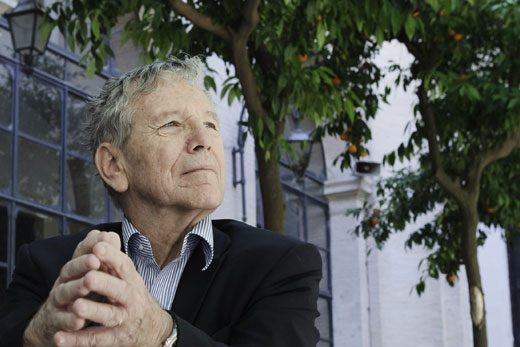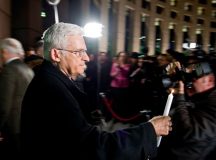Amos Oz has lived through every one of Israel’s wars and fought in two of them. He has seen hope in the peace process replaced by disappointment, compromises almost but never quite reached. Now at the age of 73, despite rockets whizzing over the border from Gaza, the threat of nuclear proliferation in Iran and little or no progress in the peace process, he remains remarkably upbeat about the possibility that, one day, his country will live in peace with its neighbours. Moreover, he asserts that, culturally, Israel is living through a golden age.
Politics and peace
Israel’s greatest novelist and one of its most ardent peace campaigners is adamant that, sooner or later, the warring parties will have no alternative but to sit down together to hammer out a solution to their problems.
Oz was in London recently for the launch of two paperbacks; his new short story collection.Scenes From Village Life, and How to Cure a Fanatic– an analysis into and a response to the fanaticism facing the world. Over coffee in the office of his publisher, he speaks calmly in his perfect English – delivering his soothing words in a soothing tone. “This government or the next government, this Palestinian leadership or the next one will eventually come to an agreement. The fact is that no one has anywhere to go. We cannot form one happy family because no one is happy and we are not one family. So we need to separate. I don’t know how long it will take and I don’t know how much innocent blood will be shed. But I do think that the silent majority on both sides is unhappily ready for a compromise on a two state solution.”
He takes comfort in the fact that neither side will be totally content with the outcome. “Do they trust each other? They do not. Will they be dancing in the street when a two-state solution is implemented? They will not, either in Israel or Palestine. But they do know there is no alternative because no one is going to be moving out.”
While there have been failed attempts to get the process moving and many disappointments, Oz also sees hope in the fact that the rhetoric of the warring parties has evolved –despite the violence there is an implicit recognition of the rights of the other. “30 or 40 years ago, the Palestinians were maintaining that Israel was like a mobile exhibition – that if they scratched themselves hard enough the infection would go; that if they screamed hard enough the world would move Israel to somewhere else. Now they know that Israel will not be going anywhere. At the same time the Israelis maintained for many decades that there was no Palestinian issue. The Palestinian problem, they said, was a vicious invention of a pan-Arab propaganda machine aimed at embarrassing Israel. Now everyone accepts that the Palestinians are for real. This is the basis for compromise.”
Although many claim that time is running out for a two state solution, and that the future for Israel and Palestine might be in forming a single nation, Oz dismisses this possibility out of hand. “The one state solution is no solution. It is senseless to push together into a honeymoon bed two deadly enemies who have been involved in fighting, bloodshed and bitterness for more than 100 years. The one-state solution didn’t work in the Balkans, Cyprus or Lebanon. There are even cracks in Belgium and Canada.”
Oz laments the demise of the Israeli peace lobby which, he says suffered as a direct result of the withdrawal from Gaza in 2005. He recalls: “For decades my colleagues and I in the peace movement recommended an Israeli withdrawal from the occupied territories. We said to our fellow Israelis that, if we terminate the military occupation of the Occupied Territories, peace will come. In 2005, Ariel Sharon conducted a unilateral withdrawal from Gaza, removing every last soldier and settler. But the result was not peace but the rain of around 10,000 rockets and missiles on Israeli towns and villages. This doesn’t make it any easier for the Israeli peace movement to advocate land for peace.” After a moment of reflection, Oz adds that the mistake was to evacuate Gaza unilaterally. Had there been an agreement reached with the Palestinian Authority there would have been no Hamas takeover in Gaza and no cascade of rockets on Israel, he maintains.
While much of the world defines Israel as a trouble spot, Oz is uplifted by what he sees as a great age of cultural energy. He says: “There is so much happening in Israel. It is not possible for me to give you the names of three or four writers who are producing excellent work because that would be unjust on the others. But I would say that, by and large, Israel is undergoing a cultural golden age in literature, arts and sciences. There is so much creativity in the country, whether that is because of or despite the political troubles it would be impossible to say.”
He adds that while a golden age is usually identified in retrospect, in Israel’s case it is clear that the nation’s cultural life is more healthy and vibrant now than at any other time in its history. He feels that it has something to do with diversity. “We Israeli Jews arrived from 136 different countries. Everyone has a love-hate relationship with the old country and this provides for a vibrant scene. There are tensions, rivalries, different philosophies and different ideas. The very variety of the scene makes for cultural vivacity.”
Life and literature
Oz’s sanguine view on the peace process and the creativity of his compatriots is not mirrored by his literature. Scenes From Village Life is not an optimistic book, featuring as it does, a variety of characters with interwoven lives in a small Israeli town, none of whom could be classified as happy. But for Oz, there is a clear dividing line between his polemical and his fictional writing. He even writes his novels and his political works in different coloured pens “I have never told a story in order to make a political point or in order to persuade people to vote one way or another. When I am in total agreement with myself I don’t write a story I write an angry article. But when I’m in slight disagreement with myself – when I hear more than one voice – that’s when I know I might be heading for a story.”
And that story tends not to be within Oz’s control. “There is a tension and a struggle between the characters and me. Sometimes I want them to go one way and they want to go another way and we struggle. I say, ‘you are working for me so you should do this and not that’. And they say ‘no you are working for us so shut up and just write’. Sometimes they take me to places that I had not foreseen at the beginning. The characters must have a life of their own, if they don’t then the story is dead.”
And as for the troubled characters in his books, well to Oz that is the very nature of fiction. “Almost the whole of literature is about unhappiness. A bridge that has been well-designed, is well built and carries 20,000 cars and 20,000 pedestrians across every day is not a story. A bridge which collapses is a story. Tolstoy starts his novel, Anna Karenina, by writing that all happy families are the same whereas every unhappy family is unhappy in its own way. If you put a gun to my head and asked me to tell you in one word what my entire body of work was about, I would say families. If you asked me for two words I would say unhappy families. If you gave me three words? Well. You would have to read my books,” he says, a mischievous grin lighting up his face.
Oz, whose original name was Amos Klausner, was born in Jerusalem in 1939. His father, Yehuda, was a right-wing intellectual who worked as a librarian and writer. But there was darkness in his family. Oz’s mother, Fania, who had suffered from depression, committed suicide when he was 14 years old. Long before that, young Amos was already making up stories, largely to impress the girls, he claims. He spent hours of contemplation when his parents were holding long discussions with their friends in cafes, leaving their son to invent imaginary lives for those who sat at neighbouring tables as he awaited his promised ice-cream.
But shortly after his mother died, Amos decided to abandon any literary ambitions. In fact he decided he would become the very opposite of his father whom he blamed for his mother’s death. He moved to a socialist kibbutz – Hulda – and vowed to pursue a pioneering existence. “My father was a right wing intellectual, I decided to become a left wing tractor driver. He was a bookish man, I decided to become an un-bookish man. He was a short man, I decided to become a tall man. I didn’t succeed with that one,” quips Oz in deadpan fashion.
Despite optimistically renaming himself Oz, the Hebrew for “strength” he did not succeed in becoming a hardened manual labourer either. “Here I am sitting in a room full of books writing still more books, which is exactly what my father wanted for me. I am aware of the irony of the situation.”
Within a few years, he was applying to a rather nonplussed kibbutz committee for time off work to concentrate on his nascent writing career. Eventually they acceded, and as Oz’s literary career took off, he was ultimately rewarded with three writing days per week.
Appropriately enough his first novel, Where the Jackals Howl, written in 1965, was set on a kibbutz. He has recently re-read the book for the first time in years. “It was a book about strong urges, subterranean passions,” he says.
He feels the kibbutz of today is a very different place from the one where he spent more than 30 years of his life. “I think today’s kibbutz is softer. The founding fathers and mothers of the kibbutz had a crazy dream. They believed they were going to change human nature in one blow. They thought that if they created equal conditions for everyone – equal work, equal shares, equal compensation and equal standard of living, then jealousy and pettiness and selfishness would disappear. Of course they were wrong because human nature is not changeable. But they lived in an ideological age when the world wanted to change human nature in one way or another. Today’s kibbutz is much more tolerant and much more forgiving. And if I had to choose between living in the 1950s kibbutz or today’s kibbutz, I would much prefer today’s.”
He likens the fading idealism of the kibbutz with the aspirations of the early Zionists. “Israel was born out of dreams. Everything that is born out of dreams is destined to disappoint to some extent. The moment you fulfil a dream there is bound to be a sense of disappointment. This is the case with Israel. The disappointment is not with the nature of Israel, it is about the nature of dreams.”
Oz decided to leave Hulda in 1986 but it was not an ideological decision, rather one taken by he and his wife Nily to help their son, Daniel’s asthma. The doctors said he required dry desert air, so they selected the town of Arad in the Negev. For some it may have been a strange decision. After all, Arad is a small, poor town, on the periphery of Israel’s economic and cultural life. For Oz, it was all perfectly logical. He was exchanging one, small intimate community for another. And as he points out, all great literature is provincial. He says: “I like small places. It’s a quiet place but it’s also very cosmopolitan. There are Jews from 36 different countries of origin and many Arabs as well. I enjoy sitting down in a street café. Strangers recognise me because I’m on television sometimes and they immediately gather around my table and start a political argument with me. I enjoy that tremendously. They try to save my soul for me and I try to save their souls for them. And when I want to be on my own I have the privacy of my study.”
When he is not travelling the world his routine is pretty much the same every day. He wakes at five every morning and walks in the desert for 40 minutes before drinking a cup of coffee and settling himself down at his desk. He says he works as if he were a shopkeeper in fact he describes his working day with the same equanimity, with which he talk about the quest for peace. “Every day I open for business like a shop does. If I have customers it’s a good day, if I don’t have customers I’m still doing my job by sitting there and waiting. So many days I just sit and wait. Sometimes people turn up and sometimes not.”







































Amos Oz was a wonderful writer, RIP